Everything you need to know about the AMD Zen processors
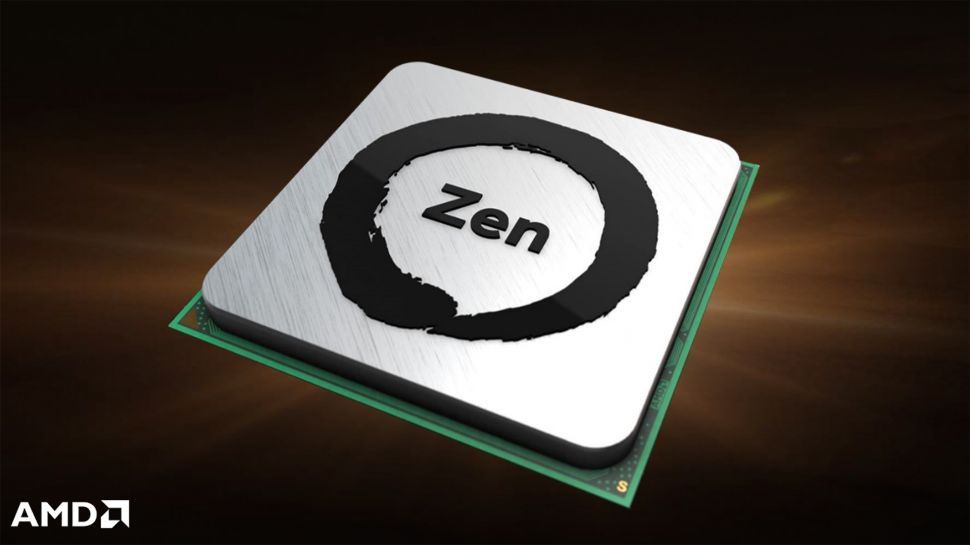
Intel has been running away with processor market share these few years while AMD has struggled to recover from a series of bad business decisions. The FX family of processors, based on the Bulldozer architecture, haven't kept the company competitive when consumers compare its processors against Intel counterparts. Cue Zen, which is AMD hopes will change the game.
So, just what is Zen?
Zen is the codename for the architecture of AMD's upcoming family of processors, which are to succeed the current FX line. Slated for an early 2017 release, this new family of chips are a new direction for AMD, starting from the ground up in designing a new processor that can take on counterparts offered by Intel.
Instead of going for increased clock speeds and higher energy consumption, AMD is cutting things back, instead going for efficiency and performance per clock. As well as new consumer CPUs, AMD is expected to release server processors and APUs in the second quarter and second half of 2017, respectively.
The upcoming Zen-based processors will utilize a 14nm FinFET process, with the production contract going to Global Foundries. This more efficient process is a solid step for the company, replacing the previous 32nm and 28nm processes used for FX CPUS and APUs. The smaller process will also lead to reduced power consumption and heat output. Interestingly, AMD will be removing the north bridge chipset from the motherboard and deploying it on the CPU itself, becoming more like a SoC (system on a chip). Again, this aids with efficiency.
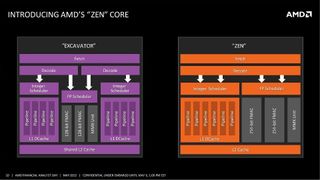
Zen is also slated to be more energy efficient than current AMD offerings, perform more instructions per cycle, and sport simultaneous multithreading (SMT), which should help AMD in bridging the gap between itself and its immediate rival. There will also be a new cache system that will aid overall efficiency. And it needs to be fast too as the company boasts substantial improvements over Excavator, the most recent microarchitecture and Zen's predecessor.
AMD claims Zen to be 40% faster than Excavator, its predecessor
These changes are fairly significant, especially the improvements to the L1 cache and introduction of SMT. AMD relied on a clustered multithread (CMT) design with its previous microarchitectures, and with this move the company will be able to have two logical CPUs per physical core, but don't mistake this for Intel's Hyperthread technology as AMD will be taking a slightly different approach called clock gating. The result, however, shouldn't be noticeably different.
Should you be rocking a current-gen AMD processor, you'll be using the company's AM3 socket. Zen will introduce a new socket, AM4 that will bring with it DDR4 RAM support. Don't think you can save that 32GB DDR3 setup though as the new chips will not support third-generation.
Get the Windows Central Newsletter
All the latest news, reviews, and guides for Windows and Xbox diehards.
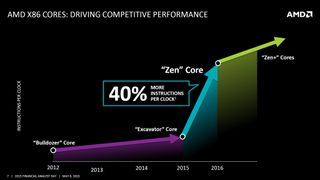
All this development was made possible after the company re-hired Jim Keller back in 2012, who subsequently departed once again in 2015. Keller was involved in developing AMD's K8 architecture, the original Athlon 64 processor, coauthoring the specifications for the x86-64 instruction set, as well as spending time at Apple to work on the A4 and A5 processors that powered iPhones. AMD was clearly read to go all-out.
Suffice to say, this could be the return of AMD as we once knew and worshipped it. However, it has been four years, Zen had better be good.
What CPUs will be available?
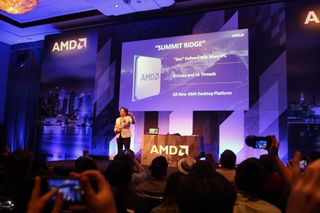
So we know what Zen is, why it's in development, what AMD aims to deliver and when we can expect to be able to make a purchase, but just what will be available for consumers once everything gets announced? The company has already revealed "Summit Ridge," which is the codename for the upcoming consumer-grade chips. This family of processors will actually start as an octo-core. That's right, AMD will offer an 8-core CPU with multithreading, for a total thread count of 16.
The company is gunning for the high-end, powerful computers here. Unfortunately, we don't know anything on pricing for the new chips. If AMD's previous launches are anything to go by though, we'd bet we'll start seeing Intel drop its prices slightly to better compete against AMD. And aforementioned, you'll need to hold out until 2017 for the Summit Ridge consumer processor. Get saving for that new rig you always wanted to build.
FAQ
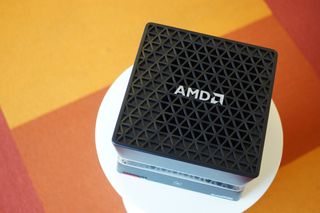
Have questions about the Zen? You've come to the right place! Whether you're wondering as to whether or not your current rig will support the new processors, or if you'll need air conditioning installed to cool it, we got you covered with this FAQ:
So, Zen is just the microarchitecture?
Correct, AMD has started anew and will be launching brand-spanking new processors based on Zen, which have their own codenames.
This isn't another Excavator?
Correct again! This isn't a mere performance upgrade. This is AMD finally fighting back against Intel for survival.
When can I buy a Zen-based CPU for my gaming PC?
You'll be able to order them from your favorite store in 2017 after the company launches "Summit Ridge" (the codename for the consumer-grade processors — We imagine FX- will make a return for naming).
Are these Zen chips going to outperform Intel?
It depends. Performance testing and what AMD has revealed thus far puts its upcoming processors on a level playing field with (and sometimes out in front of) Intel's Broadwell-E series so we could see similar levels of performance. We'll have to wait and see for benchmarks.
AMD is now using HyperThreading like Intel?
Kind of. The company is utilizing simultaneous multithreading, but it will be slightly different to how Intel does things. Essentially though, purchasing an octo-core (8 core) Summit Ridge Zen-based CPU will land you with 16 cores in Windows, yes.
Wait, so what's technically new with Zen?
On a technical level, here's what is new in Zen:
- 14nm process
- Clock gating
- Faster cache
- L1 cache is now write-back
- SMT (simultaneous multithreading)
- Dedicated stack engine
- DDR4 support
- Move elimination
- Large micro-op cache
Will my current AM3 motherboard support Zen?
No. You'll need to purchase a new AM4 socket-touting motherboard.
Hold out for #TeamRed?
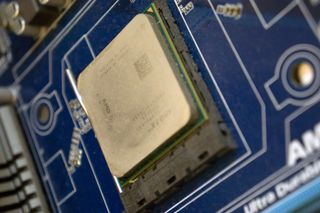
Should you wait out for Zen or build a new system now? If you can, I would recommend waiting. You could absolutely spend a solid $800 today and build an insanely powerful gaming rig with Intel, but with Zen just around the corner, it could be the case that you may have been able to save a significant amount of money without sacrificing too much (if at all) on performance.
Even if AMD doesn't offer a processor that can outperform Intel's Core series, AMD's offerings and aggressive pricing will likely make Intel bring down its prices slightly, which would be a win win for everyone, regardless as to which camp you may be part of. That all said, this is 2016. If you have a rather recent system and a capable CPU, I would potentially look at grabbing a more powerful graphics card, more RAM and other improvements.

Rich Edmonds was formerly a Senior Editor of PC hardware at Windows Central, covering everything related to PC components and NAS. He's been involved in technology for more than a decade and knows a thing or two about the magic inside a PC chassis. You can follow him on Twitter at @RichEdmonds.